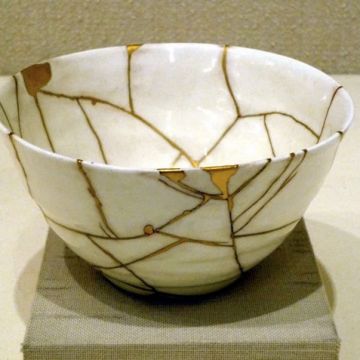What if our imperfections are just gold-filled cracks?
I know so many people who have had experience of not feeling good enough and plagued with self-doubt and suffering low self-esteem as a result. Due to poor manual dexterity due to the Functional Neurological Disorder I suffer from, I thought I would put pen to paper (or fingers to keyboard) and share my own experiences of not feeling good enough…
I suppose I have had the feeling of not being good enough for a long time now; for far too long that I am no longer able to remember exactly when these negative self-beliefs began.
“We might believe that our imperfections somehow makes us less whole. Less worthy. But We Are Enough”
These beliefs became more evident when the symptoms become a more significant part of my life, mainly the dizziness and the problems they caused with being able to handle being in certain places such as buildings with high ceilings, for example. I hated these symptoms and the limitations they placed in my life, being able to enjoy an outing to the cinema became increasingly difficult due to the severity of the dizziness and vertigo. I didn’t hate these symptoms (and later the neurological condition) just because of the limitations, but also how these set me apart from everyone else.

These symptoms began in early childhood and stayed with me throughout my adolescence and beyond. A time when any differences that set us apart from everyone else are more apparent, especially to those within our peer groups. And unfortunately, these differences can lead to bullying and ostracisation, which is what I frequently experienced throughout my school years, especially during secondary school.
In my experience, it is one thing to think negative and demeaning judgments about yourself, but to hear them from other people only reinforces these beliefs and are once again enforced on this perceptual cycle of not feeling good enough. And every time we are ignored or not given an invitation on the latest night out, or party once again reinforces to ourselves that we are not good enough. And as this perceptual cycle repeats, again and again, it is no longer a belief, but becomes our truth.
“Continuously hearing negative judgements about yourself enforces the belief we are not good enough.”
We can feel defined by our imperfections, whether they may be physical imperfections such as scars, or a perceived character flaw or like me, suffering from a medical condition that makes you different. So much so, that we are unable to recognise the positive attributes that make us stand out, and unique to those who love us unconditionally. In the past, I’ve gone on numerous courses, many of which worked on increasing self-confidence and self-esteem and part of this was to write a list of what we liked about ourselves. Asking other people who are close to me, they could list many things that they liked about me. However, I struggled to come with one single item on the blank piece of paper.


Even now at age 32, those feelings of not being good enough has followed me through those turbulent years of adolescence and into adulthood. At university, much like my school days, I lacked confidence, continually doubting my abilities, never satisfied that my latest essay was ever good enough, or convincing myself that I failed the exam I just came out of, although I never had any evidence to support these assumptions.
In today’s society, we are taught the value of being productive, and as such as someone living with a long-term neurological condition and unable to work once again reinforces this belief that I am not good enough, somehow unworthy of having beautiful things or the opportunity of good things happening to me.
I am imperfect, and the condition that is now a constant part of my daily life is somehow my most significant imperfection. An imperfection that has caused significant cracks, and weakening every part of my life. But, have you heard of the term Kintsugi? Well, kintsugi is the Japanese art of repairing broken pottery. Broken objects, such as pottery are often repaired with gold. These imperfections or flaws are seen as a unique piece of the object’s history and which adds to its beauty.

Beautiful isn’t it? So why do we not see imperfections and flaws ourselves in the same way – as something unique that adds to our beauty instead of something to be ashamed of, doing our best to hide them from others. To see something that sets us apart as something to celebrate and be proud. Yes, the symptoms of the neurological condition that I live with may make doing some activities such as going to the cinema as difficult but isn’t it the fact that I have refused to let it stop me from doing certain things that is a sign of my strength and what should be celebrated?
“Perfection is a social construct and not a reality; no one is perfect.”
The fact is that perfection is a social construct and not a reality; no one is perfect. We all have flaws and imperfections whether they may be real or imagined, but what does matter is what we believe about them. We can tend to give these flaws with more power and importance than they warrant, believing that our imperfections somehow makes us less whole. Less worthy. But in truth, we are all good enough just as we are. And our flaws and imperfections are gold-filled cracks that make us unique and adds to our beauty, and not which diminishes our light within. Remember, you are good enough just as you are.
If you would like to embrace your imperfection, explore the strengths of your quieter qualities and your unique ability to express yourself, head over to the Quiet Community (it’s free!)
By Rhiann Johns. First published at brainlesionandme.com







![How self-help books can help you with social anxiety [with recommendations]](https://quietconnections.co.uk/wp-content/uploads/2018/08/How-self-help-books-can-help-you-with-social-anxiety-768x512.jpg)